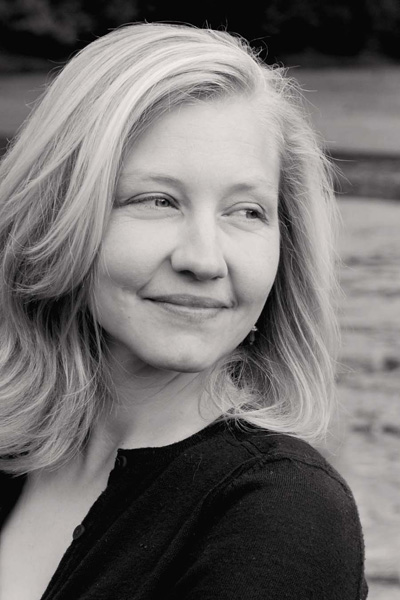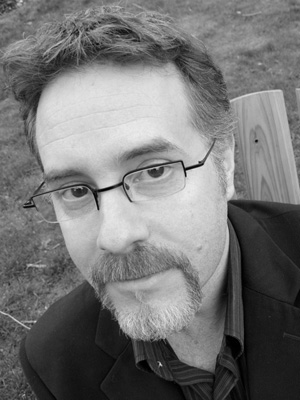Writing with Funk: John Threlfall in Conversation with Carla Funk

Malahat advisory board member John Threlfall talks with 2012 Constance Rooke Creative Nonfiction Prize winner, Carla Funk, about writing, ruminating, rambling, and asteroseismology.
No stranger to the bright lights of the local literary scene, Carla Funk served as the City of Victoria’s inaugural poet laureate (2006 to 2008) and has published four collections of poetry. Yet being an established and respected writer didn't stop Funk from entering the Malahat's 2012 Creative Nonfiction contest, where judge Madeline Sonik chose her piece “Returning” as the winner out of 125 entries.
"I was initially hooked by the relentless, poetic list of images that opens this piece and leads the reader to the leitmotif of the 'snow geese'," notes Sonik about Funk's story. "Just as the narrator is distant from the dying, self-destructive father (both physically and emotionally), the reader, too, enters this story with a long-distance view of the narrator’s world. Skillfully, the writer uses small and subtle details to draw us closer, revealing the tragedy of estrangement and the grace of consciousness and reconciliation."
Funk grew up in Vanderhoof, B.C. and currently teaches in UVic’s Department of Writing—where she received her BFA, and later went on to earn an MA in English Literature, also at UVic. Her work first appeared in the landmark anthology Breathing Fire: Canada’s New Poets, and her most recent book of poetry is Apologetic (Turnstone Press).
We asked Funk to take a few minutes out of her busy schedule to answer a few questions—which she did with her characteristic mix of insight, intelligence, and gentle humour.
You're primarily known as a poet, yet you just won a creative nonfiction prize. How often do you write nonfiction?
Over the past two years, I've been plunking away at nonfiction, rekindling my early urges for the genre. As a teenager, I had an after-school job as a typist for the community newspaper; eventually, they had me covering local stories, which somehow turned into me writing a weekly humour column called "Carla's Corner" (cringe). But I've always loved writing from life. Whenever poetry is on the backburner, nonfiction is what's cooking now.
Was "Returning" a piece that had been ruminating for a while, or was it uniquely inspired for this contest?
This piece began as a poem back in the early spring—but while it was still in progress, I happened to read an essay by Judith Ortiz Cofer in which she talked about writing her nonfiction prose as poems first, then developing them into essays. I wanted to try out her technique, so I took a rough draft of my poem and started stitch-ripping it open to make "Returning."
Length aside, what different writerly skills does it take to tackle nonfiction rather than poetry?
I don't know that I can separate one genre's necessary skill set from another. Yes, all the attention to compression and density of expression finds a new tuning with nonfiction. The distilled image suddenly has freedom to flex and breathe and talk a bit about itself. When I write nonfiction, I sometimes feel like I'm unfolding an intricate piece of origami to find the pattern of its making. But I'm finding that the tools I use to build a poem are very much the same tools I'm using in nonfiction. I even find myself turning to the iambic groove as I'm sorting out the syntax of a sentence.
At this stage of your career, do you enter many writing contests? Have you always entered writing contests? And would you recommend it for emerging writers?
I don't enter contests, usually. When I was eight, I entered the Vanderhoof Pharmacy Father's Day writing contest with a short essay about all the things I liked to do with my dad, like ride along to the bush in his Kenworth and go for pancakes at the truck stop. I made the whole thing up and felt guilt about it for years, but I did win a giant stuffed panda and a "Gambler by Kenny Rogers" aftershave set for my dad. I love the idea of writing towards a firm date, though. A writing contest is especially great for recent creative writing grads who don't know how to finish a poem, story, essay, etc. without an imposed deadline. I also love that the judging is blind, that the writing has to speak for itself. This is a good thing for writers emerging, established, and those in between.
I'm chronically aware of my own writer's eye, where seemingly everything and anyone I encounter has story potential. How do you decide what makes a good nonfiction piece—is it how a certain subject resonates within you, or that you just can't let go of it, or . . . ?
Yes—that resonance, the "can't let go of it" feeling, and the shimmer of significance that seems to accompany some moments, images, uttered words—all of these qualities draw me to write about a subject. For nonfiction, I'd add that the story itself must reach beyond the particularities of the personal and into the territory of essential truth. When the facts of a particular story are so far-fetched that, were that story rendered as fiction, the reader would scoff and say "as if," that's when I feel the need to tell the story as true, to lay it nonfictionally bare.
How did your tenure as Victoria's first poet laureate change your view of the city? And did it change your writing at all?
I'm not sure that the position changed my writing, but some of the assignments that came with the role certainly made me write poems I would never have written—like the poem to accompany the installation of the giant watering can in Beacon Hill Park. But during my tenure, I began to see the city as less anonymous and more human. What had been, in my mind, Mayor and Council, various other administrative bodies, municipalities, organizations, became people with names, faces, voices—wonderful people who really care about this community and its culture.
You have four published collections of poetry, but would you ever write a book of nonfiction—and, if so, about what?
I would love to publish a collection of short essays that blends the sarcastic wit of David Sedaris and the spiritual sensibilities of St. Francis of Assisi. I'd also love to curate an anthology of essays about small towns and how they peculiarly foster the imagination.
As a teacher, parent, wife, and engaged member of the community, when do you find time to write? That is, is it a question of doing a little bit every day or a matter of setting out a block of time in the early morning or late at night?
I'm not a writer who schedules a two-hour creative shift five days a week. I write when I can. May and June are my most productive months. When I'm teaching, I write in fragments, jotting down lines, ideas, notes, and then let these ideas simmer on the backburner until the school year is done. I revise best in the morning and write first drafts in the evening, when I'm less awake and the editor in me is sluggish.
And, as a teacher, how do you circumnavigate the usual writer's dilemma of splitting your time between the hours it takes to teach and the hours you could be putting into your own writing?
Occasionally, I feel like a hypocrite, telling my students that they need to write more, read more, when here I am, spending a good deal of time preparing for lectures, marking assignments. But then I'll sit down to read and comment on student work and suddenly I'm under the spell of a stellar poem, and I'm engaging with it critically, aesthetically, making notes in the margins about its delights and its challenges. This is reading, too, and although I'm not producing my own poems when I write feedback to the student, I'm sharpening my own critical vision.
What's one piece of advice you give to all your students, and why?
Go for a walk outside. I find that an hour's walk in the wind, rain, snow, or sun is fuel for the imagination and a cure for the muddled mind.
What inspires you?
The "thin places" where the eternal and the earthly intermingle. Common words uncommonly used. People who really know how to live, whose living magnifies what's beautiful and true in the world. Weird and glorious facts about the universe, like how stars make a kind of music, how asteroseismologists study these star sounds. This is exactly the sort of thing that stokes my curiosity and makes me want to write.
What's your greatest strength?
I love coming up with ideas.
Conversely, what's your biggest weakness?
I'm so easily distracted that I have great difficulty focusing on one idea at a time.
If not writing, then what?
Theologian-taxidermist-radio host.
Was there one person who made you want to be a writer?
I heard Lorna Crozier read for the first time just after she won the Governor General's for Inventing the Hawk. Her poems about her family and, in particular, her father, struck a match in me. Her honesty, wit, and imagination made me want to work with words.
Do you avidly follow any nonfiction writers?
I tend to read whatever subject grabs me in the genre, but I have a deep fondness for David Sedaris, Malcolm Gladwell, and Eugene Peterson.
What's one book by another author you wish you'd written?
To Kill a Mockingbird by Harper Lee.
What's the one book you want to write before you die?
If I could write a book for children as magical and resonant as any of C. S. Lewis's Chronicles of Narnia, I'd be satisfied.
A spin on the "desert island disc" scenario: what three books would you take with you to a desert island, and why?
The Bible—this story still speaks. Wallace Stevens' Collected Poems—I feel like I'll never reach the bottom of his poems; they're supreme examples of the poetic imagination, finely wrought. And Desert Island Survival for Dummies—clearly, I'd need some skills.
Finally, if you could have dinner with one author—living or dead—who would it be, and why?
Emily Dickinson. I think if she could have just cut loose a little, she'd have been a real hoot of a dinner partner. And if Emily refused to leave her attic, I'd invite Flannery O'Connor instead.

John Threlfall
* * * * * * * *









